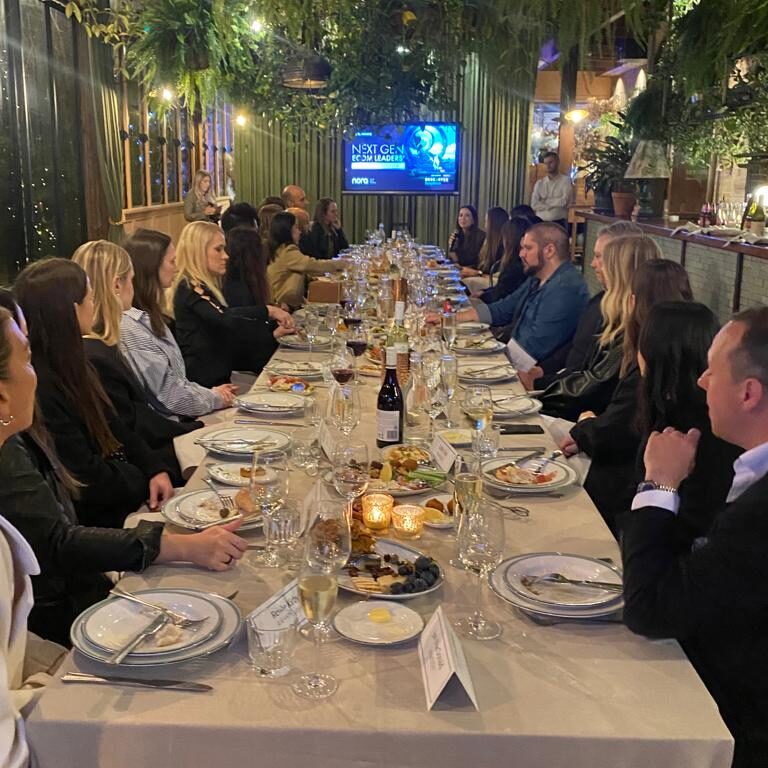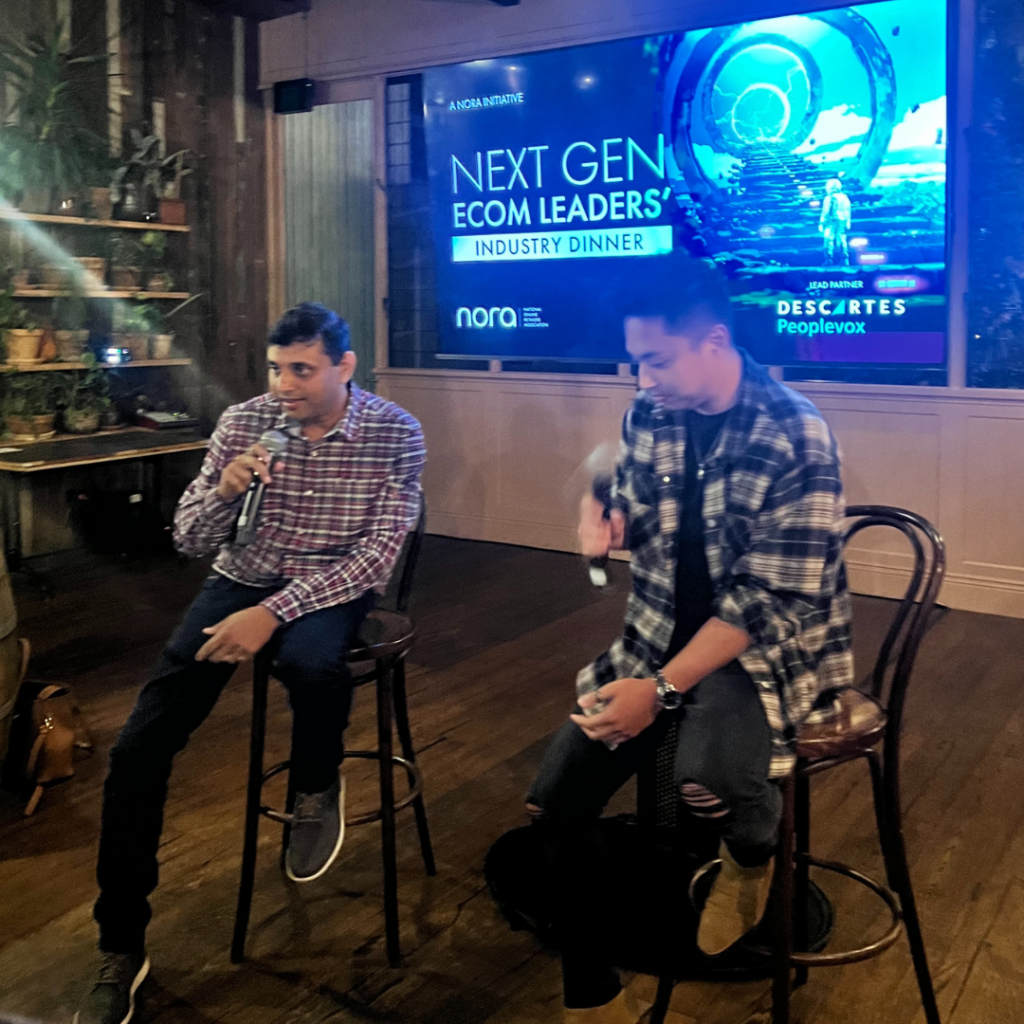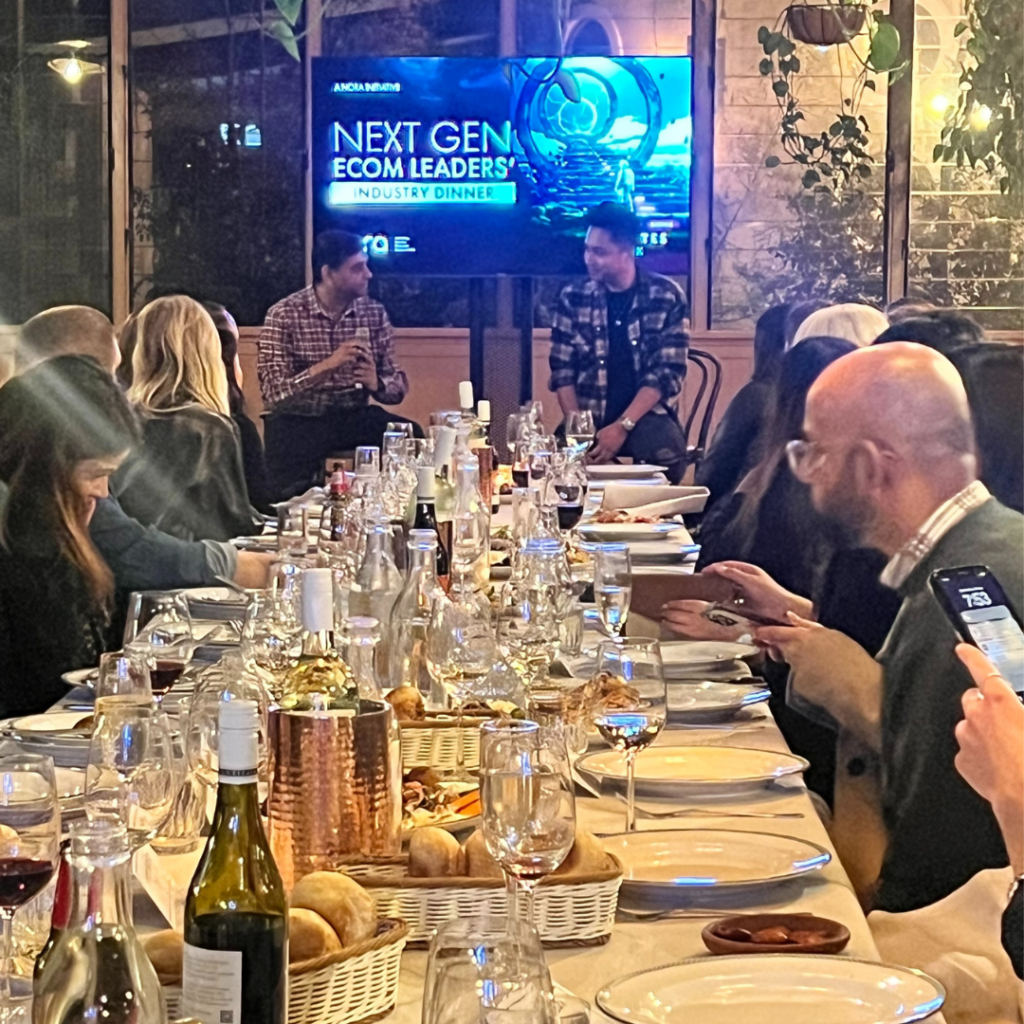On 24th May, 35 of Australia’s ‘Next Gen’ ecommerce leaders gathered at The Grounds Restaurant in Sydney for a dinner, fireside chat and networking event, hosted by Descartes Peoplevox and NORA.
Our man on the ground and Sales Lead for the APAC region, Niraj Desai, reported back enthusiastically:
‘The engagement in the room at this event was really impressive. Everyone in attendance was candid about their businesses, the challenges they are facing in the market today, and the strategies they are deploying to work through them. There was a feeling of mutual respect among peers, and that made for a brilliant, insightful and enjoyable dinner!’

Special thanks go to our long-time client Damien Park-Neilson, the Director of Operations at Meshki, who joined Niraj for a fireside chat during the event. Talking to the assembled ecommerce leaders, Niraj and Damien discussed the Meshki journey from start-up fashion brand to global womenswear pioneers. It’s a business that has grown extraordinarily over the last 5 years, and Damien has had a first-hand view at each step.

From handling 10,000 orders a day on Black Friday to moving warehouse multiple times, taking the business international and working with an ever-growing team, Damien was able to relay some of his best and most challenging moments in the brand’s history.

As for the key topics that were covered by the group, here is all you need to know:
1. Ecommerce brands are struggling with staffing.
Some retailers shared with us that they feel ‘overstaffed’. By this, they mean that they have too many people working in their operation, specifically in their warehouse, picking and packing orders, handling goods-in, etc. The obvious issue with this is an inflated salary bill each month, cutting into the bottom line of the business. However, why are they hiring so many people to help get orders out the door? Because their processes, workflows and systems are not enabling them to be more streamlined. When brands grow rapidly, and sales numbers increase, the warehouse team recruit to try and keep up, when actually they could be looking to improve their ways of working with strategic tech decisions, like implementing a WMS, that will allow them to process more orders with the same amount of people, or less! Take it from Chris, Co-Founder of UK fashion brand LOVALL, who knows that without Peoplevox, he would need to employ twice as many people in his warehouse team to process the required number of orders.
On the opposite side of this issue, other retailers are struggling to find high quality staff at an affordable rate. Salary expectations are rising, and there is increased competition between brands to recruit the best team members into warehouse-based roles. For us, again this seems like an issue that could be addressed with technology. Getting more productivity out of existing team members means the pressure to find new workers is reduced, and brands can scale more efficiently with a leaner operating model.
2. Inventory management has become a whole-company challenge
As brands grow, they tend to try out new ways to reach their customers. Starting out with their own single Shopify store, for example, before branching out to market places, retail partners and perhaps even physical stores or pop-up events, is a typical journey for an up and coming brand, especially in the DTC fashion space.
As they start to sell in more places at once, managing inventory becomes paramount. Accurate stock levels must be kept between the various channels, otherwise unselling, overselling and unexpected out-of-stocks can start to cause real issues, including customer experience problems and potential bad reviews.
The challenge is one of integration between systems and real-time data management. If store staff, marketplace listers and the ecommerce team are all working in different places, it can create multiple versions of ‘truth’ when it comes to inventory levels. However, with an agile, integrated tech stack and some smooth technical workflows, brands can manage a multi-faceted, multi-channel operation and maintain one, true, single source for their inventory.
3. Customer segmentation is a golden bullet for ecommerce marketing teams
As marketing and customer data platforms advance their capabilities, ecommerce brands are finding more lucrative, and sometimes even ingenious ways to segment their audiences and drive profitable marketing campaigns. Where in the past, one email with a discount code would go out to everyone, now, brands are pulling apart the data on audience activity and working out exactly who will be incentivized to buy what, and when. Win-back campaigns when someone hasn’t shopped for over a month, referral codes to expand their audience through word of mouth, instore – online cross-modal campaigns – you’re probably looking at an inbox full right now and it’s not going to stop.
4. Going global – how do you manage fulfillment overseas?
A particular topic for this group of Australian brands – how do we look to ship in new markets? There are a range of options out there for brands looking to ‘go global’, but each come with their complexities and costs. Brexit hasn’t made things any easier for UK based brands, so we see a lot of our customers fulfilling their orders from their own UK based warehouse, and potentially working with a 3PL for European orders. For Aussie brands, often breaking into North America is the big goal – Princess Polly, Showpo and Verge Girl have done it successfully, but it takes a great deal of planning, cashflow and operational precision. If you outsource, you are trusting a huge chunk of your company to outsiders who, despite their best intentions, are never going to care as much about your brand as you are. And if you try and set up your own warehouse in a new country, that requires hiring, travelling, learning how to be an employer on foreign soil… the list of work goes on even before day one of trading.
Danny Hancock, COO of Lorna Jane, gave us his insights on this topic as well in an interview last year. It’s at the forefront of the minds of brand builders and founders across the industry, so we will see which international shipping strategies come out on top in the coming years.
Overall, the dinner in Sydney proved once again that the ecommerce industry is a brilliant network of eager, positive people who are all looking to learn and share as trusted peers. Cheers and see you at the next one!





